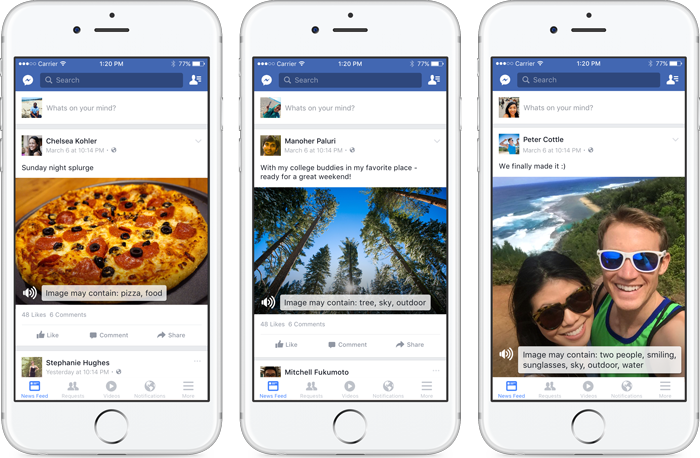Facebook CEO Mark Zuckerberg today held his first ever Live Q and A session. The whole thing lasted for just under an hour - if you want to take in the full session, here it is.
Zuckerberg answered a range of questions, some of them relatively mundane, some weird (Zuckerberg confirmed that he, in fact, not a lizard), and others offered some additional insight into where Facebook is headed - or, at least, what types of technologies and developments have caught Zuckerberg's eye in recent times.
Facebook Folders?
The first question, which was the most popular based on Likes, related to whether Facebook would ever provide users with folders to store files and photos. And the answer? No.
Explained Zuckerberg:
"There are all these different kinds of things that people care about - there are day-to-day moments with your friends and family, almost everyone has an interest or something that they care about or multiple interests, and we want to create spaces and tools for you to share everything that you care about with everyone who you want."
In terms of actually new products or additions to assist with this process, Zuckerberg kind of deflected, saying that people can share specific content in private or topical spaces, like Messenger threads or Groups, to keep ideas and discussions co-ordinated. Zuckerberg also took the opportunity to note that more than a billion people use Groups around the world.
Global Unity
The second question related to how technology can enhance learning outcomes and education, with Zuckerberg discussing the benefits of personalized learning programs, something he's looking to explore further through his philanthropic efforts.
Zuckerberg also discussed the role platforms like Facebook can play in connecting the world and helping solve complex large-scale problems like climate change and equality. Zuckerberg called social media a set of tools that can be used as the basis for a global communications structure, through which we can come together and 'level-up humanity', viewing ourselves as less of a world defined by borders and more of a global community that needs to unite to tackle these kinds of complex challenges.
Zuckerberg also noted that more than half of the world is still not connected to the internet, something Facebook's seeking to tackle through initiatives like internet.org in order to open up all the opportunities of the world to all people.
Pay to Play?
Zuckerberg also put to rest any debate over whether Facebook will ever charge for their service.
"Facebook is free and always will be"
Zuckerberg noted that this is fundamental to their mission to 'make the world more open and connected', and that they would continue to subsidise their platform through ads to maintain free access.
A Future of Thoughts, Not Content
Given Facebook's big focus on virtual and augmented reality applications of late, it was no surprise to see Zuckerberg also address future computing platforms. Zuckerberg said that AI is one of the areas of technology that he's most excited about for Facebook, citing the ways in which AI can help those with vision or hearing impairments experience Facebook by facilitating new process, like the recent additions of automated photo descriptions and subtitles.
 On the next evolution of Facebook, Zuckerberg discussed the way the internet, in general, has advanced over time as people seek to share more of their experiences with others. Ten years ago, Zuckerberg said, the internet was all text. We then evolved to photos, and now to video, as these are the mediums which have best enabled us to capture and share our feelings.
On the next evolution of Facebook, Zuckerberg discussed the way the internet, in general, has advanced over time as people seek to share more of their experiences with others. Ten years ago, Zuckerberg said, the internet was all text. We then evolved to photos, and now to video, as these are the mediums which have best enabled us to capture and share our feelings.
"But the question you have to ask is 'is video the end of the line?'"
According to Zuckerberg, the answer is definitely 'no'.
"And to me, that's what VR is about - that presence, feeling like you're actually there with someone."
Zuckerberg also noted that he doesn't think VR and AR are the end of the line either, providing two examples of next level research that's happening right now that could change the way we communicate.
Zuckerberg noted that there's a team at Berkeley who are conducting research which involves taking an MRI of a person's brain as they do various - watching TV, reading a book, etc. From that, the researchers are able to map the various thought patterns and, essentially, predict what people thinking based on subsequent brain activity. Zuckerberg says this may eventually give us the ability to share pure thought.
Pretty freaky - particularly in a Facebook context.
Zuckerberg also noted that research is being conducted into how we might one day be able to transfer memories from one person to another. Zuckerberg cited a study where mice were put through a maze, which they'd learn, then the researchers were able to transfer that maze map onto another mouse who'd never seen the same maze before.
"That's just kind of straight up 'The Matrix'"
But 50 years from now, according to Zuckerberg, such applications may not be a crazy concept.
Maybe, one day, Facebook will be a repository for thought exchange. No words, no video. Just a new plane of existence, connected to the master brain.
Advancing Live
Zuckerberg also discussed the evolution of Facebook live and live-streaming more broadly, saying that Live is a big area they're working on that there are a lot of things that could be a lot better about streaming.
For example, Zuckerberg noted how cool it would be if viewers could 'drop-in' to ask questions. Of course, you can already do this on the now superceded Meerkat, which introduced a feature called 'Cameo' about a year back.
 That's likely not quite what Zuckerberg is referring to, but the capability does sound similar, giving viewers a way to participate in the conversation in a real, back and forth exchange.
That's likely not quite what Zuckerberg is referring to, but the capability does sound similar, giving viewers a way to participate in the conversation in a real, back and forth exchange.
Zuckerberg said that live-streaming is a completely new format and that Facebook has a 'long roadmap of things' to make Live better.
Changing the World
In response to a question about entrepreneurship and building a company, Zuckerberg said the biggest question he thinks aspiring start-ups and entrepreneurs should ask themselves is 'what change do you want to make in the world'. Zuckerberg said he started Facebook to give people a way to share what was happening in college, and that was the driving ambition behind Facebook, not making a company as such.
If he started over again in the modern day, Zuckerberg said he would have made a mobile app instead of a website, given the massive shift to mobile, but his driving ambition would be the same.
"Connecting people around the world, because that's what I'm passionate about."
Don't think about building a company, Zuckerberg said, think about what change you want to make in the world and work from that basis.
And then Jerry Seinfeld came in. For some reason. And they talked about breakfast.
It was a wide-ranging broadcast, touching on various subjects. Nothing groundbreaking, no big announcements, but interesting, nonetheless, to see what's capturing the imagination of the CEO of the world's largest social network.
So, a Facebook of pure thought. Should be interesting.








